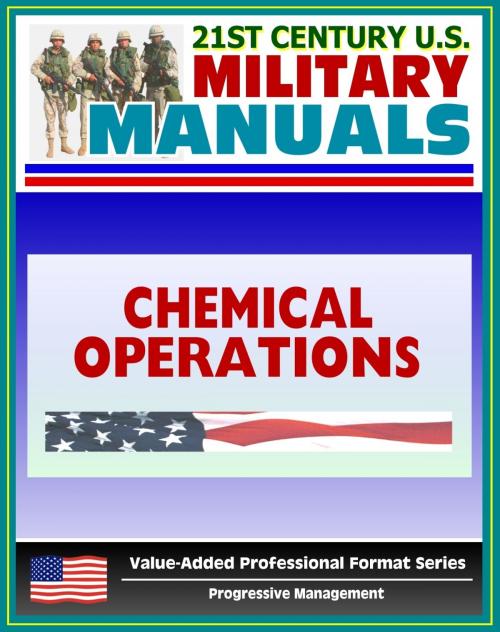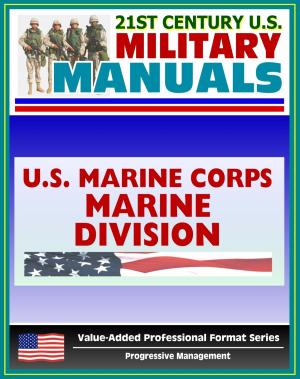21st Century U.S. Military Manuals: Chemical Operations Principles and Fundamentals - FM 3-100 (Value-Added Professional Format Series)
Nonfiction, Science & Nature, Technology, Military Science, Social & Cultural Studies, Political Science| Author: | Progressive Management | ISBN: | 9781466087675 |
| Publisher: | Progressive Management | Publication: | September 9, 2011 |
| Imprint: | Smashwords Edition | Language: | English |
| Author: | Progressive Management |
| ISBN: | 9781466087675 |
| Publisher: | Progressive Management |
| Publication: | September 9, 2011 |
| Imprint: | Smashwords Edition |
| Language: | English |
Part of our value-added professional format series, the Chemical Operations Principles and Fundamentals Field Manual (FM ) covers the principles and fundamentals of NBC and chemical operations. This FM has been converted for accurate flowing-text e-book format reproduction.
In the preface, it states:
"FM 3-100 is the Chemical Corps capstone manual. It describes the principles and fundamentals of chemical operations in support of Army operations. It applies to operations during war - combat operations under nuclear, biological, and chemical (NBC) conditions - and operations other than war. It is intended for chemical leaders and staff officers. However, it is also appropriate for other branches and services as a basis for policies and procedures. This manual describes the principles and fundamentals of the chemical mission areas - NBC defense, smoke, non-lethal, and flame operations. It provides general guidance for the employment of chemical units and chemical personnel on the modem battlefield. It discusses chemical doctrinal concepts in relation to Army operations doctrine. Weapons of mass destruction are weapons that through use of or threat of use can cause large-scale damage and contamination, shifts in objectives, phases, and courses of action. NBC weapons are weapons of mass destruction. NBC defense consists of measures which enable friendly forces to survive, fight, and win against enemy use of nuclear weapons, biological or chemical agents. US forces apply NBC defensive measures before and during integrated warfare. In integrated warfare, opposing forces employ nonconventional weapons along with conventional weapons. NBC weapons are nonconventional. The term "BNW" describes combat where one or both combatants possess nuclear weapons. The combatants may or may not have employed these weapons. BNW encompasses the pre-nuclear and post-nuclear phases as well as active nuclear warfare. Under BNW, forces take nuclear defense measures such as dispersion against possible enemy nuclear strikes. Similarly, the term "NBC conditions" describes combat where one or both combatants possess nonconventional weapons. The combatants may or may not have employed these weapons, but the capability exists. Under NBC conditions forces must take a full range of NBC defensive measures to counter possible enemy NBC attacks. FM 3-100 describes US combat operations under NBC conditions. It is divided into four parts: Part One, The NBC Challenge. This part describes the NBC combat environment, US policy, and NBC fundamentals of the Army operations. Part Two, Operational Principles. This part describes the basic principles of battle management, NBC defense, and smoke. It describes the use of, and defensive against, flame and incendiary devices. Part Three, Planning and Organization. This part describes the Chemical Corps role in planning combat operations. It discusses chemical organizations and organizational principles. It further explains sustainment planning for chemical units and the chemical mission.
As a bonus, this reproduction includes FM-1, The Army Field Manual, a capstone manual containing the vision for the Army - sold separately for $5.99. FM 1 establishes the fundamental principles for employing Landpower. The most important of these are the Army's operational concept and the fundamentals that support it. They form the foundation for all Army doctrine. All Soldiers should understand and internalize them. FM 1 describes the American profession of arms, the Army's place in it, and what it means to be a professional Soldier.
This is a privately authored news service and educational publication of Progressive Management.
Part of our value-added professional format series, the Chemical Operations Principles and Fundamentals Field Manual (FM ) covers the principles and fundamentals of NBC and chemical operations. This FM has been converted for accurate flowing-text e-book format reproduction.
In the preface, it states:
"FM 3-100 is the Chemical Corps capstone manual. It describes the principles and fundamentals of chemical operations in support of Army operations. It applies to operations during war - combat operations under nuclear, biological, and chemical (NBC) conditions - and operations other than war. It is intended for chemical leaders and staff officers. However, it is also appropriate for other branches and services as a basis for policies and procedures. This manual describes the principles and fundamentals of the chemical mission areas - NBC defense, smoke, non-lethal, and flame operations. It provides general guidance for the employment of chemical units and chemical personnel on the modem battlefield. It discusses chemical doctrinal concepts in relation to Army operations doctrine. Weapons of mass destruction are weapons that through use of or threat of use can cause large-scale damage and contamination, shifts in objectives, phases, and courses of action. NBC weapons are weapons of mass destruction. NBC defense consists of measures which enable friendly forces to survive, fight, and win against enemy use of nuclear weapons, biological or chemical agents. US forces apply NBC defensive measures before and during integrated warfare. In integrated warfare, opposing forces employ nonconventional weapons along with conventional weapons. NBC weapons are nonconventional. The term "BNW" describes combat where one or both combatants possess nuclear weapons. The combatants may or may not have employed these weapons. BNW encompasses the pre-nuclear and post-nuclear phases as well as active nuclear warfare. Under BNW, forces take nuclear defense measures such as dispersion against possible enemy nuclear strikes. Similarly, the term "NBC conditions" describes combat where one or both combatants possess nonconventional weapons. The combatants may or may not have employed these weapons, but the capability exists. Under NBC conditions forces must take a full range of NBC defensive measures to counter possible enemy NBC attacks. FM 3-100 describes US combat operations under NBC conditions. It is divided into four parts: Part One, The NBC Challenge. This part describes the NBC combat environment, US policy, and NBC fundamentals of the Army operations. Part Two, Operational Principles. This part describes the basic principles of battle management, NBC defense, and smoke. It describes the use of, and defensive against, flame and incendiary devices. Part Three, Planning and Organization. This part describes the Chemical Corps role in planning combat operations. It discusses chemical organizations and organizational principles. It further explains sustainment planning for chemical units and the chemical mission.
As a bonus, this reproduction includes FM-1, The Army Field Manual, a capstone manual containing the vision for the Army - sold separately for $5.99. FM 1 establishes the fundamental principles for employing Landpower. The most important of these are the Army's operational concept and the fundamentals that support it. They form the foundation for all Army doctrine. All Soldiers should understand and internalize them. FM 1 describes the American profession of arms, the Army's place in it, and what it means to be a professional Soldier.
This is a privately authored news service and educational publication of Progressive Management.















